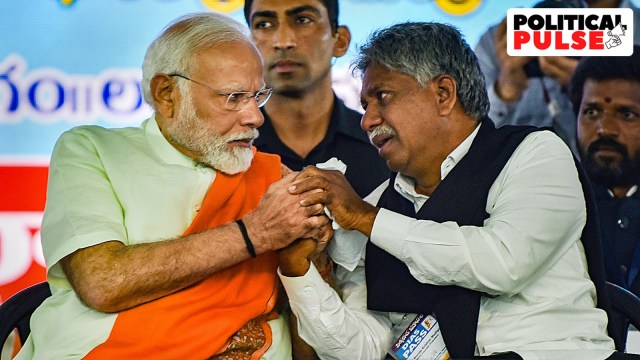Behind that picture of PM Modi consoling Madiga leader, BJP’s Dalit outreach in Telangana
In 16 of Telangana's 33 districts, the Madiga community outnumbers Malas and to bring them over to its side the BJP has promised a panel for classification of SC sub-groups.
 Prime Minister Narendra Modi consoles Madiga Reservation Porata Samithi chief Manda Krishna Madiga who got emotional during a public meeting in Secunderabad, Telangana. (PTI)
Prime Minister Narendra Modi consoles Madiga Reservation Porata Samithi chief Manda Krishna Madiga who got emotional during a public meeting in Secunderabad, Telangana. (PTI)
One of the defining images of this election season came on November 11 as Prime Minister Narendra Modi consoled a teary-eyed Dalit leader on the stage at a public meeting in Secunderabad. Behind the photograph of Modi and Madiga Reservation Porata Samithi (MRPS) founder Manda Krishna Madiga, which was shared widely, is the story of the BJP’s outreach to Scheduled Caste (SC) communities in the southern state that votes on November 30.
The crux of the party’s Dalit outreach is centred in 16 of the state’s 33 districts where the Madiga community outnumbers Malas, another Dalit subgroup. While the BJP has not yet warmed up to the idea of a caste census that the Opposition has made its primary agenda in states such as Madhya Pradesh and Chhattisgarh, in Telangana it has promised to constitute a committee for the classification of SC sub-groups, a promise Modi made in Secunderabad. The party is concentrating on Madigas since they outnumber Malas 60% to 40% at most places and hold grievances for not getting quota as per their numerical strength.
Manda Krishna Madiga has accused the Bharat Rashtra Samiti (BRS), the ruling party in the state, and the Congress of ignoring Madigas, saying “The BJP has promised to classify SC sub-groups. We hope they will fulfil it. We have been demanding for several decades that there should be a survey of SC sub-castes, and quota and reservation in jobs, education, welfare Budgets should be based on the numerical strength of each sub-caste. BJP is the first party which has promised to do so.”
 Of the 119 Assembly constituencies, 19 are reserved for SCs
Of the 119 Assembly constituencies, 19 are reserved for SCs
BJP leaders in the state are hopeful that the PM’s announcement and the party’s massive outreach programme will translate into votes. “Malas and Madigas don’t vote en masse for any party. They individually vote for different parties. We have to see how successful we will be but the massive attendance at the PM’s meeting was very encouraging,” said a BJP functionary.
 Behind the photograph of Modi and Madiga Reservation Porata Samithi founder Manda Krishna Madiga, which was shared widely, is the story of the BJP’s outreach to Scheduled Caste communities in the southern state that votes on November 30. (PTI)
Behind the photograph of Modi and Madiga Reservation Porata Samithi founder Manda Krishna Madiga, which was shared widely, is the story of the BJP’s outreach to Scheduled Caste communities in the southern state that votes on November 30. (PTI)
On Monday, state BJP president and Union Minister G Kishan Reddy said the party was committed to the promise of categorisation of SC groups. “The constitution of the committee is aimed at speeding the process. BJP will stand by its word. Think about this before casting your vote,’’ he appealed to voters. Explaining why the Mala community is in favour of categorisation, Manda Krishna Madiga said, “There are fewer Malas (compared to Madigas) but yet they have a fair share in government jobs and education sector. Madigas who are more in number have been left behind. Malas are also well-represented in politics and civil services. Madigas need representation based on their numbers.”
According to the BRS government, Dalits constitute 18-19% of the state’s population. The MRPS estimates that based on the 2011 Census, the SC population is 54,32,680, of whom 32,22,642 are Madigas and 15,27,143 are Malas. While the districts of Mancherial, Jayashankar Bhoopalpalli, Nagarkurnool, and Jangaon have 21 to 24.7% SC population, Khammam, Jogulamba Gadwal, Hanumkonda, Peddapali, Vikarabad, Suryapet, Karimnagar, Siddipet, Rajanna Sircilla, Sangareddy, and Nalgonda have 18.1 to 19.9% Dalits. The district of Yadadri Bhuvanagir has a 17.7% SC population. The other districts that have more than 15% SC population are Nirmal, Kamareddy, Warangal, Mulugu, Komaram Bheem, Wangaparthy, Narayanpet, Medak, and Jagtiyal (15 to 16.7%).
 The MRPS estimates that, based on the 2011 Census, the SC population is 54,32,680, of whom 32,22,642 are Madigas and 15,27,143 are Malas.
The MRPS estimates that, based on the 2011 Census, the SC population is 54,32,680, of whom 32,22,642 are Madigas and 15,27,143 are Malas.
Of the 119 Assembly constituencies, 19 are reserved for SCs while three of the 17 parliamentary seats are earmarked for Dalits (Warangal, Nagarkurnool, and Peddapalli). The BJP has also been reaching out to the SC farming community. As per the Telangana State Statistical Report, 2022, there are 8,54,151 farmers from SC communities of whom 73% own less than 2.5 acres of land each while 17.3% are small farmers. The BJP is seeking to capitalise on resentment among these farmers about the BRS government’s Rythu Bandhu farm investment support scheme as they feel forward castes that own more land stand to benefit more.
The government launched the Dalita Bandhu scheme to keep the SC community placated. The scheme provides a one-time financial assistance of Rs 10 lakh per beneficiary family but there is discontent in the community that not everyone is receiving the benefits and the selection process is slow. Chief Minister K Chandrashekar Rao had promised that at least 2,000 beneficiaries in each Assembly constituency would receive the benefits.





- 01
- 02
- 03
- 04
- 05


























